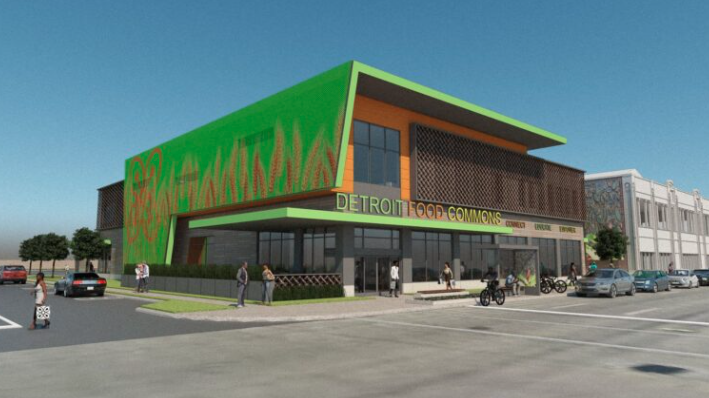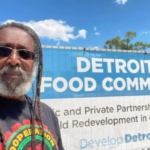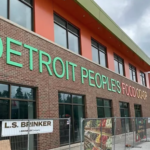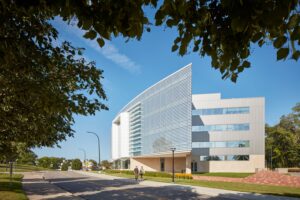
- Kim Kisner
- Community
- 09/12/2023
Detroit People’s Food Co-op Champions Food Security and the Circular Economy

The Detroit People’s Food Co-op – projected to open in February at 8324 Woodward Ave. in Detroit’s North End – is an African-American-led, community-owned grocery cooperative. It seeks to address the issue of food insecurity, educate the community about nutrition and sustainability, support local businesses, and pump investment back into the area.
Malik Yakini is the cofounder and executive director of the Detroit Black Community Food Security Network, the nonprofit organization that led the formation of the co-op, and serves on the co-op’s board. SBN Detroit spoke to Yakini about the co-op’s vision and sustainability goals.

Q: Tell me about Detroit People’s Food Co-op.
A: The Detroit People’s Food Co-op is a grocery store that’s in the development stage and is owned by member-owners. It’s projected to open in February 2024 and will have a full line of groceries, including produce sourced locally and regionally. It will carry value-added products that are produced by local entrepreneurs, and as much as possible we will hire staff from Detroit.
The most significant part of a co-op is that it is not a corporation coming into Detroit to profit. It’s people in the community banding together to co-own the store so that the community reaps the benefits and profits. Currently, we have 1,958 member-owners.
In this pre-opening stage, the member-owners make a lot of the decisions and shape the direction and culture of the store. The member-owners elect six of the nine members of the co-op’s board of directors, and DBCFSN appoints the other three. In June, the board contracted with an interim general manager who is tasked with getting the final pre-opening tasks done, coordinating the opening, and making sure that the store is positioned for success. The board hopes to hire a permanent general manager in the next few months.
The other benefit of being a member-owner is the opportunity to share in the profits of the store. In any year the store is profitable, member-owners get a percentage.
Q: What inspired the co-op?
A: It grew out of discussions within the Detroit Black Community Food Security Network. When the network was founded in 2006, one of the goals was to support existing co-ops and to create this new food co-op. So, this has been percolating for 17 years.
It grew out of the desire of members of the network to push back against extractive economic practices we see in Black communities within the food realm. There is only one Black-owned grocery store in Detroit – Linwood Fresh Market – and that is very recent. For a city that has an African American population of 80%, to have other ethnic groups owning almost all of the retail food outlets in the city and extracting those profits from the city just isn’t right
I don’t want to overgeneralize. Some of the stores are doing a good job at community partnerships and some are not. But the desire is to push back against an economy where others come in and set up stores and use the profits for their communities and families. We want to keep the profits and decisions here in our community.
A co-op is one of the best ways to contribute toward a circular economy.
Q: Why do you think the co-op is critical from a business perspective?
A: The co-op model is an important model that has historically been used by Blacks and others marginalized by the mainstream economy. It broadens the ownership base and by doing that, those member-owners provide some of the financing for the business as well as receive some of the profits. So it’s a model that is more accessible to low- and moderate-income community members who don’t have access to the capital.
Q: Does this create job opportunities for those in the community?
A: Yes. We are expecting the grocery store to create more than 40 new jobs. Above the store, DBCFSN will operate a banquet hall and kitchen facilities that will create more.
An important piece of the kitchen facilities is that they will be available for rental, which we hope will inspire food entrepreneurs to step into this arena, and those doing it to scale up their businesses.
So yes, the vision is to create specific jobs at the store and to stimulate new and existing food businesses.
Q: What is the economic impact on the community?
A: I can’t give specific dollar amounts, but generally what happens when a business like this opens, it creates new jobs in the community. And now you have more people in the community with income being spent in the community. We are expecting that in this way the presence of the co-op will stimulate the economy in the area.
We are also already seeing an increase in property values, which is a mixed blessing. We want to revitalize this community, which has seen distress, but at the same time, we need to make sure that development happens in an equitable way and doesn’t push out existing residents. This is a dilemma we are faced with.
Q: Do you think this acts as an example for others in Southeast Michigan to replicate?
A: One of the things we know is that Detroit is in some ways the canary in the coal mine. Detroit is an example of what happens as the economy shifts from industrial to more information-based.

We are acutely aware that Detroit is being watched by the world. So as we develop this and other programs, we are certainly creating a model that’s being watched globally, so we move with that awareness. I hope this model is replicated around the world.
Q: How will the co-op educate the community about sustainability?
A: An important part of the co-op will be community education. We are concerned about nutrition and health and also the health of the planet because they are bound together. So we have a number of activities that will be geared toward educating community members about issues related to the food system, how the food system currently is one of the biggest contributors to global warming, and how farming can mitigate impacts, etc.
We will also hold workshops and lectures by authors on nutrition, food, and educational programming to broaden the understanding of food justice, equity, and sustainability.
Q: How do you think the co-op helps keep community engagement and the character of the community intact?
A: The business is owned by community members, so it’s the community that shapes it. Right now, committee members are working on interior design and making sure it’s reflective of the community.
An example of this is the extraction of trees that were in what is now the store’s parking lot. We had them cut down and then milled them into planks. We are looking at creative ways to incorporate them into the design of the store as a tribute to the place we are in. We want to maintain the character and give a nod to the historical legacy that exists here.
Be sure to subscribe to our newsletter for regular updates on sustainable business practices in and around Detroit.
Kim Kisner
- All
- Business
- Community
- Education
- Events

The Chip Bag Project, based in Detroit, is a sustainability initiative that upcycles hard-to-recycle snack packaging — particularly chip bags — into insulated sleeping bags for individuals experiencing homelessness. Founded by Eradajere Oleita, the project addresses both environmental waste and housing insecurity by transforming materials like Mylar into practical, thermally efficient solutions. In June, Oleita was among Trelllis’s 30 Under 30, its annual recognition of the brightest young...

PowerPanel, headquartered in Oxford, focuses on sustainable energy technology with a particular emphasis on hot water systems and thermal energy capture. The company designs and manufactures modular solar hybrid systems that integrate both photovoltaic and thermal components into a single unit. Its goal is to offer energy solutions that are more efficient, durable, and economically viable for a range of commercial and industrial applications. SBN Detroit interviewed Garth...

The Detroit VA Healthcare System is implementing a systemwide sustainability strategy through its Green Environmental Management System (GEMS), designed to reduce waste, lower energy consumption, and improve operational efficiency. The program recently earned Practice Greenhealth’s “Top 25 Environmental Excellence Award.” Through coordinated efforts across departments and a commitment to innovation—particularly in high-resource areas like dialysis—the Detroit VA works to demonstrate how environmental stewardship and clinical care can go...







